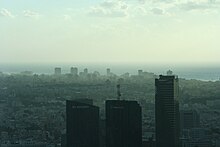Bat Yam





Bat Yam (Template:Lang-he-n) is a city located on Israel's Mediterranean coast, on the central coastal strip, just south of Tel Aviv. Part of the Gush Dan metropolitan area, in the Tel Aviv District, the city is located on the Mediterranean Sea and is home to 130,000 people.
History
Early history
Bat Yam was established in 1926 as Bayit VaGan (Template:Lang-he-n; House and Garden), and was geared toward Orthodox Jews. During the 1929 Palestine riots, Bayit VaGan came under attacks by Arab gangs from neighbouring Jaffa and was evacuated by British Authorities before being reestablished in 1930. In 1936 the town was given the status of local council, and in 1938, the name of the town was changed to Bat Yam.
Israeli Independence
Following the United Nations vote in favour of a partition plan on November 29, 1947, and the subsequent outbreak of violence, Bat Yam came under heavy attack from Jaffa, until Jaffa surrendered on May 13, 1948.
In the years following Israel's independence, Bat Yam grew dramatically due to mass immigration, gaining the status of a city in 1958. As more and more immigrants moved to the city, socio-economic problems began to appear. Relatively low real estate prices and a building boom during the 1970s and 1980s, saw even more migrants from lower socio-economic strata, mainly second- and third generation descendants of Jewish immigrants from Arab countries move into the city. As a result, middle-class veteran inhabitants of Bat Yam started to move out, primarily to the newer suburbs of Rishon LeZion, a boomtown south of Bat Yam.
The city gained a sizeable community of Jews from Turkey and has therefore hosted visits from the Turkish president, Süleyman Demirel, and prime minister, Tansu Ciller.
Recent history
Bat Yam once again experienced a period of rapid growth early 1990s with the mass-immigration from the former Soviet Union leading to many choosing Bat Yam as their new home due to its proximity to the industrial centres of the country, and relatively low real estate prices. The influx of Russians, however, did nothing to help the city's socio-economic crisis, and by the early 2000's, following financial scandals resulting from the declining local leadership, the city was placed at the brink of bankruptcy. Bat Yam became synonymous with urban decay, with a reputation for having waste left in streets, and poor sanitation.
In the 2003, a new mayor, Shlomo Lahiani, was elected and the city has slowly began to rejuvenate, with some areas having already been transformed. There remain to this day, however, some zones of the city which still suffer from the issues which plagued the whole of this city just a few years ago. A small Hasidic enclave of Bobover Hasidim, known as Kiryat Bobov, has also been established in Bat Yam.
Tourism
The location of Bat Yam on the Mediterranean makes it popular with beach-goers. Furthermore the city has several museums, including the Bat Yam City Museum "Ben Ari", the Museum "Ryback" with a collection of paintings of the painter, Issachar Ber Ryback. There is also a museum in the memory of the Yiddish writer Sholem Asch who lived his last years in Bat Yam, and a small Holocaust museum.
Leaders
| Type | Name | Years |
|---|---|---|
| Head of council | Mintz Ben Zion | 1936-1937 |
| Head of council | Israel Ben Zion | 1937-1939 |
| Head of council | Israel Rabinovich-Teomim | 1939-1943 |
| Head of council | Eliav Levai | 1943-1950 |
| Head of council | David Ben Ari | 1950-1958 |
| Mayor | David Ben Ari | 1958-1963 |
| Mayor | Menahem Rothschild | 1963-1973 |
| Mayor | Yitzhak Walker | 1973-1977 |
| Mayor | David Mesika | 1977-1978 |
| Mayor | Menahem Rothschild | 1978-1983 |
| Mayor | Ehud Kanmon | 1983-1993 |
| Mayor | Yehoshua Sagi | 1993-2003 |
| Mayor | Shlomo Lahiani | 2003-date |
Twin cities
 Kragujevac, Serbia
Kragujevac, Serbia Neukölln, Germany
Neukölln, Germany Livorno, Italy
Livorno, Italy Antalya, Turkey
Antalya, Turkey Kutno, Poland
Kutno, Poland Villeurbanne, France
Villeurbanne, France Valparaíso, Chile
Valparaíso, Chile Aurich, Germany
Aurich, Germany
Famous residents
- Sholem Asch (1880-1957) Polish-born, Yiddish writer, has a museum of his work in the city.
- Eli Cohen (1924-1965) Egyptian-born, Israeli spy who was executed in Damascus in 1965, has a main street in the city named after him.
- Matt Haimovitz (1970 - ) US celloist
- Arye Kaspi (1945 - 2003) Israeli journalist
- Shlomo Lahiani (1965 - ) Israeli politician and businessman, mayor of the city
- Kobi Israel (1970 - ) Israeli-British photographer
- Rami Levi (1968 - ) Israeli ballet dancer
- Avi Peretz (1966 - ) Israeli popular singer
- Alon Porat (1951 - ) Israeli painter
- Ronen Menachem (1969 - ) Israeli cinema director
- Peter Rott (1974 - ) Israeli pop singer and composer
- Itzik Zohar (1970 - ) Israeli soccer player

